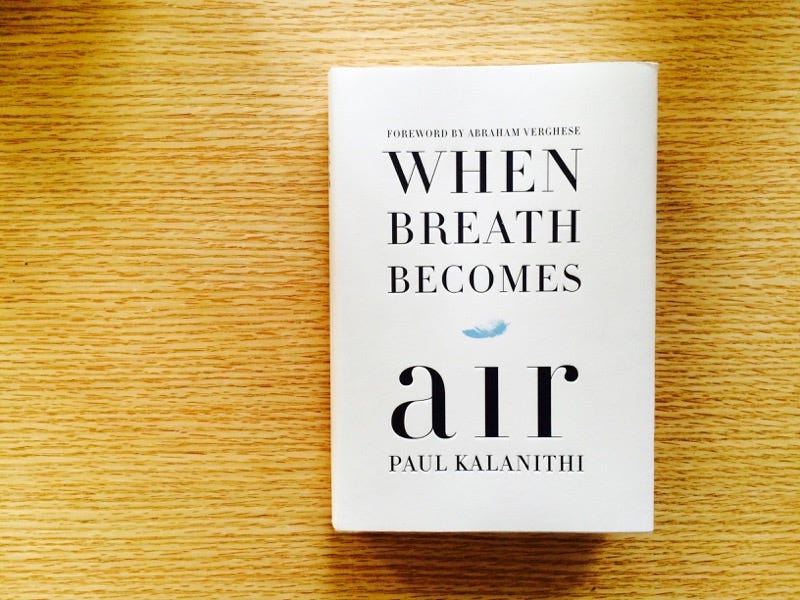When Breath Becomes Air

A post from Andy:
.
I never met Paul Kalanithi.
.
We knew each other for a total of four months, talked on the phone a bunch of times (more than once, while he was in the middle of a chemo treatment), and exchanged a flurry of emails on writers we loved, his upcoming trip to the Super Bowl, and the direction his book—the book we were working on together—should take in the end. The truth is, despite Paul's incredible warmth, his sense of humor, and his willingness to engage so fully in the writer-editor relationship, I was a little intimidated by him, by the immensity of what he had accomplished at so young an age: Stanford neurosurgeon, father, husband, holder of many degrees, reciter of romantic poems, deep thinker, supremely calm, kind, and rational person—when it came to questions of mortality and, as Paul put it, what it means to live a meaningful life, I figured my job was just to shut up and listen for once. So I did. And on these subjects, Paul had so much to say. So many of the passages in his book will stay with me, will comfort, challenge, and inspire me, for the rest of my days. Here, a few examples, but a caveat: I could have quoted twenty more passages like this, passages so crystalline and beautiful, so essentially true, they make me want to weep.
. On the duty of a doctor: .
“As a resident, my highest ideal was not saving lives – everyone dies eventually – but guiding a patient or family to an understanding of death or illness… The physician’s duty is not to stave off death or return patients to their old lives but to take into our arms a patient and family whose lives have disintegrated and work until they can stand back up and face, and make sense of, their own existence.”
On the fleeting nature of ambition:
“Everyone succumbs to finitude. I suspect I am not the only one who reaches this pluperfect state. Most ambitions are either achieved or abandoned; either way, they belong to the past. The future, instead of the ladder toward the goals in life, flattens out into a perpetual present. Money, status, all the vanities the preacher of Ecclesiastes described hold so little interest: a chasing after the wind, indeed.”
On facing a terminal diagnosis:
“I would have to learn to live in a different way, seeing death as an imposing itinerant visitor but knowing that even if I’m dying, until I actually die, I’m still living.”
On confronting mortality:
“Severe illness wasn’t life-altering, it was life-shattering. It felt less like an epiphany – a piercing burst of light, illuminating What Really Matters – and more like someone had just firebombed the path forward, and now I would have to work around it…The fact of death is unsettling. Yet there is no other way to live.”
On holding his infant daughter, Cady, as his own health faltered:
“Day to day, week to week, Cady blossoms: a first grasp, a first smile, a first laugh. Her pediatrician regularly records her growth on charts, tick marks of her progress over time. A brightening newness surrounds her. As she sits in my lap smiling, enthralled by my tuneless singing, an incandescence lights the room."
On time:
"Time for me now is double-edged: Every day brings me further from the low of my last relapse, but closer to the next recurrence — and eventually, death. Perhaps later than I think, but certainly sooner than I desire. There are, I imagine, two responses to that realization. The most obvious might be an impulse to frantic activity: to “live life to its fullest,” to travel, to dine, to achieve a host of neglected ambitions. Part of the cruelty of cancer, though, is not only that it limits your time, it also limits your energy, vastly reducing the amount you can squeeze into a day. It is a tired hare who now races. Even if I had the energy, though, I prefer a more tortoise-like approach. I plod, I ponder. Some days, I simply persist.”
When Paul died in March of last year, at the age of thirty-seven, we lost a remarkable writer, but we lost an even more remarkable person. Doing the last of the work on his book, When Breath Becomes Air, with his incredible wife, Lucy, was as heartbreaking—and yet affirming and fulfilling—as anything I’ve done. One of Paul’s last wishes was for Lucy to shepherd his book to publication, and she did. Boy, did she ever. She did it with such strength and grace, and in the process, even became a writer herself. Because Paul died before the book was finished, Lucy wrote the epilogue, and said what he could not. “Often I return to the grave after leaving flowers – tulips, lilies, carnations – to find the heads eaten by deer," she writes. "It's just as good a use for the flowers as any, and one Paul would have liked. The earth is quickly turned over by worms, the processes of nature marching on, reminding me of what Paul saw and what I now carry deep in my bones, too: the inextricability of life and death, and the ability to cope, to find meaning despite this, because of this. What happened to Paul was tragic, but he was not a tragedy.”
Paul Kalanithi and Lucy Goddard Kalanithi, author of "My Marriage Didn't End When I Became a Widow," in today's New York Times.



